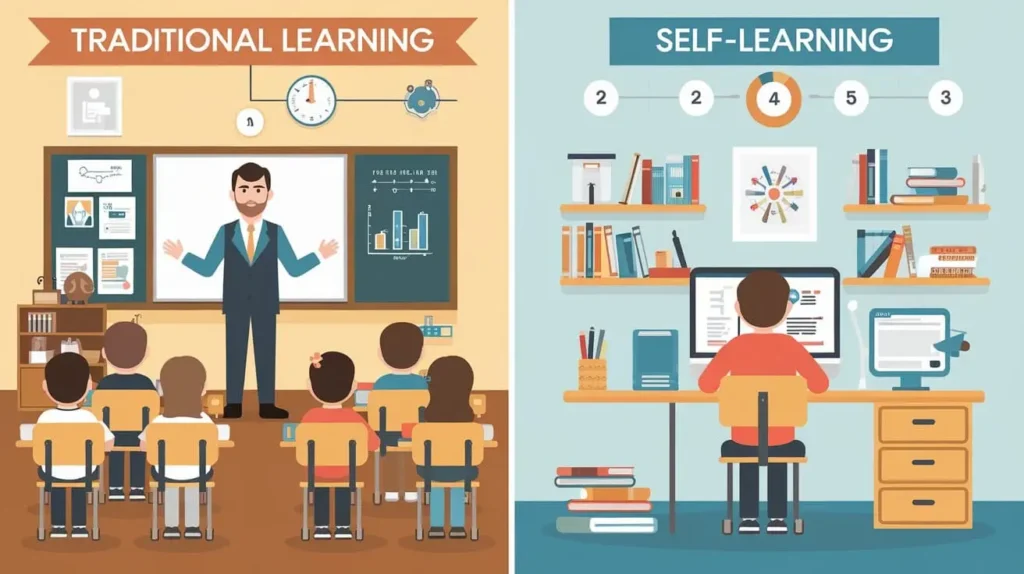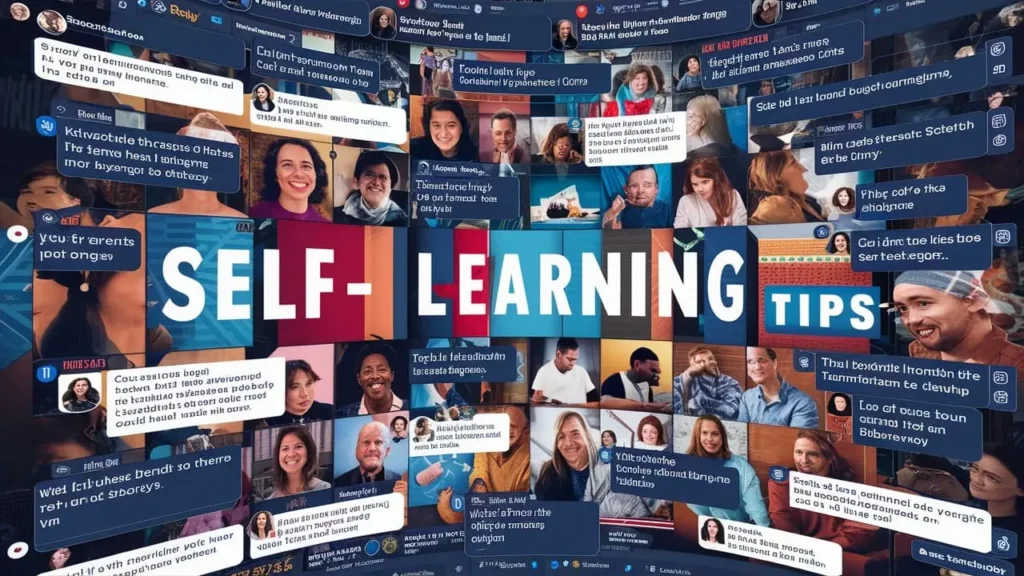Why Self-Learning is the Key to Unlocking Your Potential in 2025
Imagine waking up one day and realizing you’ve mastered a skill you’ve always dreamed of—without stepping into a classroom. That’s the power of self-learning. In a world where technology evolves faster than ever, the ability to teach yourself new skills isn’t just an advantage; it’s a necessity.
By 2025, the demand for continuous learning will be higher than ever. According to the World Economic Forum, 85 million jobs will be displaced by automation, while 97 million new roles will emerge that require advanced skills. Remote work and digital transformation are reshaping industries, and those who can adapt through self-learning will thrive.
But where do you start? How do you ensure your self-learning efforts are effective and not just a waste of time? In this article, we’ll explore 10 proven strategies to help you become a master of self-learning, so you can stay ahead in 2025 and beyond.
Table of Contents
What is Self-Learning and Why Does It Matter?
Self-learning is the process of acquiring knowledge or skills independently, without formal instruction. It’s about taking control of your education, setting your own pace, and tailoring your learning to your unique needs. Unlike traditional learning, which often follows a rigid curriculum, self-learning allows you to focus on what truly matters to you.
In 2025, self-learning will be more important than ever. Here’s why:
- Lifelong Learning: The half-life of skills is shrinking. What you know today may be obsolete in a few years. Continuous learning is essential to stay relevant.
- Career Growth: Employers value employees who can upskill independently. Self-learners are often seen as proactive and adaptable.
- Personal Development: Learning new skills boosts confidence, enhances creativity, and opens doors to new opportunities.
Traditional Learning vs. Self-Learning

| Aspect | Traditional Learning | Self-Learning |
|---|---|---|
| Flexibility | Fixed schedules | Learn at your own pace |
| Cost | Often expensive | Affordable or free |
| Customization | Limited to curriculum | Tailored to your needs |
| Accessibility | Location-dependent | Accessible anywhere, anytime |
| Pace | Set by the institution | Set by you |
Self-learning offers flexibility, affordability, and customization, making it the ideal choice for the fast-paced world of 2025. It empowers you to take charge of your education and adapt to the ever-changing demands of the modern workforce.
10 Proven Strategies for Effective Self-Learning in 2025
1. Set Clear and Achievable Goals
Without a clear direction, self-learning can feel overwhelming. Start by setting SMART goals: Specific, Measurable, Achievable, Relevant, and Time-bound. For example:
- Instead of saying, “I want to learn coding,” set a goal like, “I will complete a Python course and build a basic app within 3 months.”
This approach keeps you focused and motivated. Break down your goals into smaller milestones to make them more manageable. For instance, if your goal is to learn graphic design, your milestones could include mastering specific tools like Adobe Photoshop or Canva, completing a design project, and building a portfolio.
2. Create a Structured Learning Plan
A well-structured plan is the backbone of effective self-learning. Break your goals into smaller, manageable tasks and create a timeline. Tools like Trello, Notion, or Asana can help you organize your learning journey. For example:
- Week 1: Complete the first module of your course.
- Week 2: Practice coding exercises or design challenges.
- Week 3: Start a small project to apply what you’ve learned.
Having a plan ensures you stay on track and make consistent progress. It also helps you allocate time effectively, especially if you’re balancing self-learning with other responsibilities like work or family.
3. Leverage Online Learning Platforms
The internet is a treasure trove of resources. Platforms like Coursera, Udemy, Khan Academy, and edX offer courses on virtually every topic. Here’s a quick list of free and paid resources:
- Free: Khan Academy, YouTube, edX, MIT OpenCourseWare.
- Paid: Coursera, Udemy, LinkedIn Learning, Skillshare.
Choose platforms that align with your learning style and budget. Many platforms also offer certifications that can enhance your resume and demonstrate your skills to potential employers.
4. Use the Pomodoro Technique for Focus

Distractions are the enemy of self-learning. The Pomodoro Technique can help you stay focused. Here’s how it works:
- Work for 25 minutes, then take a 5-minute break.
- After four cycles, take a longer break (15-30 minutes).
Apps like Focus Booster, TomatoTimer, or even a simple timer can help you implement this technique effortlessly. This method not only improves focus but also prevents burnout by ensuring you take regular breaks.
5. Join Online Communities and Forums

Learning doesn’t have to be a solitary journey. Join online communities like Reddit, Stack Overflow, or LinkedIn groups to connect with like-minded individuals. These platforms offer:
- Peer Support: Share your challenges and successes with others.
- Answers to Your Questions: Get help from experts and experienced learners.
- Networking Opportunities: Build connections that can lead to collaborations or job opportunities.
Engaging with a community can also provide accountability, as you’re more likely to stay committed when others are cheering you on.
6. Practice Active Recall and Spaced Repetition
These evidence-based techniques can supercharge your learning:
- Active Recall: Test yourself regularly to reinforce what you’ve learned. For example, after reading a chapter or completing a module, quiz yourself on the key concepts.
- Spaced Repetition: Review material at increasing intervals to improve retention. Tools like Anki or Quizlet can help you implement spaced repetition effectively.
These techniques are particularly useful for mastering complex subjects or retaining large amounts of information over time.
7. Apply What You Learn Through Projects
Theory is important, but practice is where real learning happens. Start small projects to apply your knowledge. For example:
- If you’re learning graphic design, create a portfolio website or design a logo for a fictional company.
- If you’re learning coding, build a simple app or game.
Projects not only reinforce your learning but also provide tangible evidence of your skills, which can be showcased to potential employers or clients.
8. Track Your Progress Regularly
Tracking your progress keeps you motivated and helps you identify areas for improvement. Use journals, apps, or spreadsheets to monitor your growth. Here’s a sample progress tracker:
| Date | Skill | Time Spent | Progress |
|---|---|---|---|
| Jan 1, 2025 | Python Basics | 2 hours | Completed Module 1 |
| Jan 5, 2025 | Python Basics | 3 hours | Completed Module 2 |
| Jan 10, 2025 | Python Basics | 4 hours | Started a small project |
Regularly reviewing your progress can also help you adjust your learning plan if needed.
9. Stay Consistent and Motivated
Consistency is key to self-learning. Here are some tips to stay motivated:
- Reward Yourself: Celebrate milestones, no matter how small.
- Visualize Your End Goal: Keep your long-term objectives in mind.
- Remind Yourself Why You Started: Reflect on your reasons for learning and how it will benefit you.
It’s also helpful to establish a routine. Dedicate specific times each day or week to your learning, and treat it as a non-negotiable commitment.
10. Embrace Failure as Part of the Process
Failure is inevitable, but it’s also a valuable learning opportunity. Adopt a growth mindset and view setbacks as stepping stones to success. As Thomas Edison once said, “I have not failed. I’ve just found 10,000 ways that won’t work.”
When you encounter challenges, take a step back, analyze what went wrong, and adjust your approach. Remember, every mistake brings you closer to mastery.
Tools and Resources to Supercharge Your Self-Learning Journey
Must-Have Apps and Platforms
- Duolingo: For language learning.
- Quizlet: For flashcards and quizzes.
- Evernote: For note-taking and organization.
- Notion: For creating structured learning plans.
- Anki: For spaced repetition and active recall.
Books on Self-Learning
- “The Art of Learning” by Josh Waitzkin.
- “Mindset: The New Psychology of Success” by Carol S. Dweck.
- “Atomic Habits” by James Clear.
Start Your Self-Learning Journey Today
Self-learning is more than just a skill—it’s a mindset. By 2025, those who can adapt and learn independently will have a significant edge in the job market and beyond. Pick one strategy from this list and start implementing it today. Remember, the best time to learn something new is now. Your future self will thank you.
FAQ Section
1. What is the best way to start self-learning?
Begin by identifying your goals and choosing a structured learning plan. Use online platforms to access resources and track your progress regularly.
2. How can I stay motivated while self-learning?
Set small, achievable goals, reward yourself for milestones, and join online communities for support and accountability.
3. Are there free resources for self-learning?
Yes, platforms like Khan Academy, YouTube, and Coursera (with free courses) offer excellent resources for self-learners.
4. How long does it take to see results from self-learning?
It depends on your goals and consistency, but with regular practice, you can start seeing progress in as little as a few weeks.
5. Can self-learning replace formal education?
While self-learning is highly effective, it may not completely replace formal education in fields that require certifications or hands-on training. However, it can complement formal education and help you stay ahead in your career.
6. What is a Self-Learning Method?
A self-learning method is an approach where individuals take control of their own education, setting goals, choosing resources, and managing their progress independently. It involves techniques like active recall, spaced repetition, and project-based learning to acquire new skills or knowledge without formal instruction.
7. What is Self-Directed Learning?
Self-directed learning is a process where learners take full responsibility for their education. This includes identifying their learning needs, setting objectives, finding resources, and evaluating their progress. It’s a key skill for lifelong learning and adapting to the fast-changing demands of the modern world.
8. Is Self-Learning Better?
Self-learning offers several advantages over traditional learning, including:
Flexibility: Learn at your own pace and schedule.
Cost-Effectiveness: Many resources are free or affordable.
Customization: Tailor your learning to your specific needs and interests.
However, it requires self-discipline and motivation, which can be challenging for some. For many, a blend of self-learning and formal education works best.
9. What is Online Self-Learning?
Online self-learning refers to the use of digital platforms and tools to acquire knowledge or skills independently. Popular platforms include Coursera, Udemy, and Khan Academy, which offer courses on a wide range of topics. Online self-learning is convenient, accessible, and often interactive, making it a popular choice for modern learners.
By following these strategies and leveraging the right tools, you can unlock your full potential and thrive in the rapidly changing world of 2025. Start your self-learning journey today and take control of your future!

